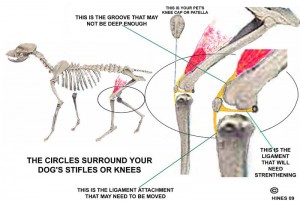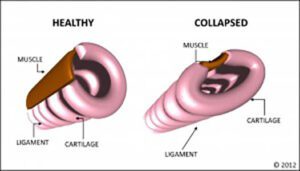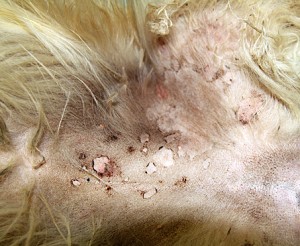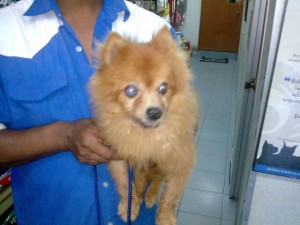Pomeranians are beloved for their small size, fluffy coats, and energetic personalities. However, like all breeds, Pomeranians are prone to certain health issues, many of which are related to their genetic makeup and physical structure. From alopecia to black skin disease and luxating patella, understanding the potential health concerns that can affect Pomeranians is essential for providing the best care and ensuring they live long, happy, and healthy lives.
In this comprehensive guide, we’ll explore the most common health issues that Pomeranians face, provide insights into how to spot early signs of trouble, and offer tips on keeping your Pom in peak health.
Common Health Issues in Pomeranians
-
Alopecia (Hair Loss)
 One of the most common health issues affecting Pomeranians is alopecia, which is characterized by the loss of hair. This condition is particularly troubling for Poms due to their iconic fluffy coats. While all dogs shed, alopecia in Pomeranians can lead to bald patches, often beginning on the back and progressing to other areas.
One of the most common health issues affecting Pomeranians is alopecia, which is characterized by the loss of hair. This condition is particularly troubling for Poms due to their iconic fluffy coats. While all dogs shed, alopecia in Pomeranians can lead to bald patches, often beginning on the back and progressing to other areas.
The causes of alopecia in Pomeranians can be varied, including hormonal imbalances, allergies, or genetics. Alopecia X, also known as Black Skin Disease, is one of the more severe forms and often causes skin darkening along with hair loss. The exact cause of this condition is not entirely understood, but it is thought to be hereditary.
Treatment:
- Regular vet visits are essential if you notice signs of alopecia in your Pomeranian.
- Hormonal therapy, supplements, or changes in diet may help manage the condition.
- In cases where Black Skin Disease is suspected, consult with a vet for possible treatment options, which can include melatonin or other therapies.
-
Black Skin Disease
As mentioned, Black Skin Disease is a form of alopecia that results in hair loss and the darkening of the skin, especially in males. It typically begins when Pomeranians are young and progresses as they age. The condition is believed to be linked to genetics and affects the skin’s ability to regenerate fur. While it is not life-threatening, it can be distressing for both the dog and the owner.
Symptoms:
- Patchy hair loss starting from the back or tail area.
- Skin discoloration or darkening in affected areas.
- A dry, flaky appearance to the skin.
Treatment:
- There is no definitive cure for Black Skin Disease, but proper management can help slow its progression.
- Regular grooming and bathing with specialized shampoos can help improve skin condition.
- A vet may recommend hormone supplements like melatonin to help stimulate hair regrowth.
-
Luxating Patella (Knee Dislocation)
 Luxating patella, or a kneecap dislocation, is a common orthopedic issue in small dog breeds like Pomeranians. This condition occurs when the kneecap slips out of place, causing discomfort, limping, or an abnormal gait. Luxating patella can range in severity from mild cases that cause occasional discomfort to severe cases that may require surgery.
Luxating patella, or a kneecap dislocation, is a common orthopedic issue in small dog breeds like Pomeranians. This condition occurs when the kneecap slips out of place, causing discomfort, limping, or an abnormal gait. Luxating patella can range in severity from mild cases that cause occasional discomfort to severe cases that may require surgery.
Symptoms:
- Limping or skipping on one leg.
- Intermittent lameness, particularly after activity.
- Visible signs of discomfort when walking or running.
Treatment:
- For mild cases, maintaining a healthy weight and providing joint supplements (such as glucosamine and chondroitin) can help reduce strain on the knees.
- In more severe cases, surgery may be required to correct the dislocation.
- Physical therapy and regular vet checkups are recommended to monitor the condition.
-
Collapsing Trachea
 Pomeranians, like many toy breeds, are prone to collapsing trachea, a condition in which the tracheal rings lose their strength, leading to breathing difficulties. This condition is often exacerbated by pulling on a collar, especially during walks. The signs of a collapsing trachea can range from mild coughing to severe respiratory distress.
Pomeranians, like many toy breeds, are prone to collapsing trachea, a condition in which the tracheal rings lose their strength, leading to breathing difficulties. This condition is often exacerbated by pulling on a collar, especially during walks. The signs of a collapsing trachea can range from mild coughing to severe respiratory distress.
Symptoms:
- A honking or wheezing cough, especially during excitement or physical exertion.
- Difficulty breathing or wheezing, particularly in hot or humid conditions.
- Gagging or choking sounds.
Treatment:
- Use a harness instead of a collar to prevent pressure on the trachea during walks.
- Avoid exposure to irritants like smoke, dust, or allergens that can worsen breathing problems.
- In more severe cases, a vet may prescribe medications to help manage inflammation and coughing. Surgery is an option in very severe cases.
-
Dental Issues
Due to their small size, Pomeranians are particularly prone to dental problems, including plaque buildup, tartar, gum disease, and even tooth loss. Poor dental hygiene can lead to more serious health issues such as heart disease or infections, so it’s important to take dental care seriously.
Symptoms:
- Bad breath (halitosis).
- Swollen or bleeding gums.
- Reluctance to eat or difficulty chewing.
- Visible tartar buildup on teeth.
Treatment:
- Regular at-home brushing with dog-safe toothpaste is essential.
- Provide dental chews or toys that help clean the teeth.
- Schedule regular professional dental cleanings with your vet.
-
Hypothyroidism
 Pomeranians can suffer from hypothyroidism, a condition where the thyroid gland does not produce enough hormones, leading to a slowed metabolism. This can cause a range of symptoms, including weight gain, lethargy, and skin issues.
Pomeranians can suffer from hypothyroidism, a condition where the thyroid gland does not produce enough hormones, leading to a slowed metabolism. This can cause a range of symptoms, including weight gain, lethargy, and skin issues.
Symptoms:
- Unexplained weight gain despite normal feeding habits.
- Lethargy or reluctance to exercise.
- Dry, thinning coat or hair loss.
- Frequent skin infections or itchiness.
Treatment:
- Hypothyroidism is usually managed with daily hormone replacement medication.
- Regular blood tests are required to monitor thyroid levels and adjust medication as needed.
- A balanced diet and regular exercise are important for managing weight and overall health.
-
Eye Issues
 Pomeranians are susceptible to certain eye conditions such as cataracts, dry eye, and progressive retinal atrophy (PRA), which can lead to vision loss over time. Early detection is important for managing these issues and preventing them from worsening.
Pomeranians are susceptible to certain eye conditions such as cataracts, dry eye, and progressive retinal atrophy (PRA), which can lead to vision loss over time. Early detection is important for managing these issues and preventing them from worsening.
Symptoms:
- Cloudy or opaque eyes.
- Redness, swelling, or discharge around the eyes.
- Rubbing or pawing at the eyes.
- Difficulty navigating or bumping into objects.
Treatment:
- Routine eye exams by a vet can help detect and manage eye conditions early.
- In the case of cataracts or PRA, surgery may be an option to restore or improve vision.
- Artificial tears or medicated eye drops can help with dry eye conditions.
-
Heart Disease
Pomeranians, especially as they age, are at risk of developing heart disease. Mitral valve disease, which affects the heart’s ability to pump blood properly, is common in small breeds. Regular vet checkups can help identify early signs of heart problems.
Symptoms:
- Coughing, especially at night or after exercise.
- Difficulty breathing or rapid breathing.
- Lethargy or reduced interest in physical activities.
- Swollen abdomen (a sign of fluid buildup).
Treatment:
- While there is no cure for heart disease, medications can help manage symptoms and improve the quality of life.
- A low-sodium diet and regular, gentle exercise are important for dogs with heart issues.
- Regular monitoring by a vet, including chest X-rays and heart ultrasounds, can help track the progression of the disease.
Tips for Keeping Your Pomeranian Healthy
While Pomeranians are prone to certain health issues, there are steps you can take to minimize the risk and keep your Pom in optimal health. Here are some essential tips to help maintain your Pomeranian’s well-being:
-
Regular Vet Visits
Routine vet checkups are key to catching health issues early before they become severe. Your vet can perform regular health screenings, dental cleanings, and vaccinations to ensure your Pomeranian remains healthy.
-
Balanced Diet
A well-balanced diet rich in high-quality protein, healthy fats, and essential nutrients is crucial for maintaining your Pomeranian’s health. Since Poms are prone to weight gain, portion control and a proper feeding schedule are essential. Discuss dietary options with your vet to ensure your dog gets the right nutrition for their specific needs.
-
Exercise
While Pomeranians are small, they still need regular exercise to stay fit and avoid obesity, which can exacerbate other health issues like luxating patella and heart disease. Daily walks and playtime will help keep them mentally and physically stimulated.
-
Dental Care
Dental hygiene is a major aspect of Pomeranian care. Brush your Pom’s teeth regularly and provide dental chews to help prevent plaque buildup. Schedule regular dental cleanings with your vet to avoid more serious dental problems.
-
Grooming and Skin Care
Regular grooming is not only essential for maintaining your Pomeranian’s fluffy coat, but it also helps prevent skin issues like dryness and irritation. Use a high-quality shampoo and conditioner formulated for dogs and avoid over-bathing, which can strip natural oils from the skin.
-
Weight Management
Maintaining a healthy weight is essential for preventing obesity-related issues like joint problems and heart disease. Monitor your Pomeranian’s weight closely and adjust their diet and exercise routine as needed.
-
Use a Harness, Not a Collar
To prevent or reduce the risk of collapsing trachea, always use a harness instead of a collar when walking your Pomeranian. A harness reduces pressure on the neck and throat, especially if your dog tends to pull during walks.
-
Supplements
Consider adding supplements to your Pomeranian’s diet, particularly those that support joint health (like glucosamine and chond roitin) and skin and coat health (like ENZYMX All Natural Antioxidant Formula). Consult with your vet before introducing any new supplements to ensure they’re appropriate for your Pomeranian’s needs.
-
Monitor Behavior and Symptoms
Always keep an eye on any changes in your Pomeranian’s behavior or physical condition. Early signs of health issues can be subtle, such as reduced energy, changes in appetite, or mild coughing. Being proactive and addressing these symptoms early can prevent more serious conditions from developing.
-
Mental Stimulation
Pomeranians are intelligent and active dogs that require regular mental stimulation to stay happy and healthy. Providing puzzle toys, engaging in training exercises, and playing interactive games can help prevent boredom-related behavioral issues and contribute to their overall well-being.
A Happy, Healthy Life for Your Pomeranian
Pomeranians are loving, lively companions, but they come with specific health challenges that require diligent care. By staying informed about potential health issues such as alopecia, Black Skin Disease, luxating patella, collapsing trachea, dental problems, and others, you can take proactive steps to manage these conditions and ensure your Pomeranian leads a happy, healthy life.
With regular veterinary checkups, a balanced diet, proper exercise, good dental hygiene, and careful grooming, you’ll be able to minimize the risk of many common health issues and provide your Pomeranian with the best care possible. While Pomeranians may be small, they have big personalities and a lot of love to give, and keeping them healthy is the best way to ensure that they enjoy a long and joyful life by your side.
By following these guidelines and remaining attentive to your Pomeranian’s health and well-being, you can enjoy many years of companionship with your fluffy friend, knowing that they are in the best possible condition.
Related Posts:
Pomeranian Skin Issues and Diseases
Understanding Alopecia in Pomeranians
Congestive Heart Failure in Pomeranians
Why Pomeranian Dental Care Is Vital for Your Fur Baby
